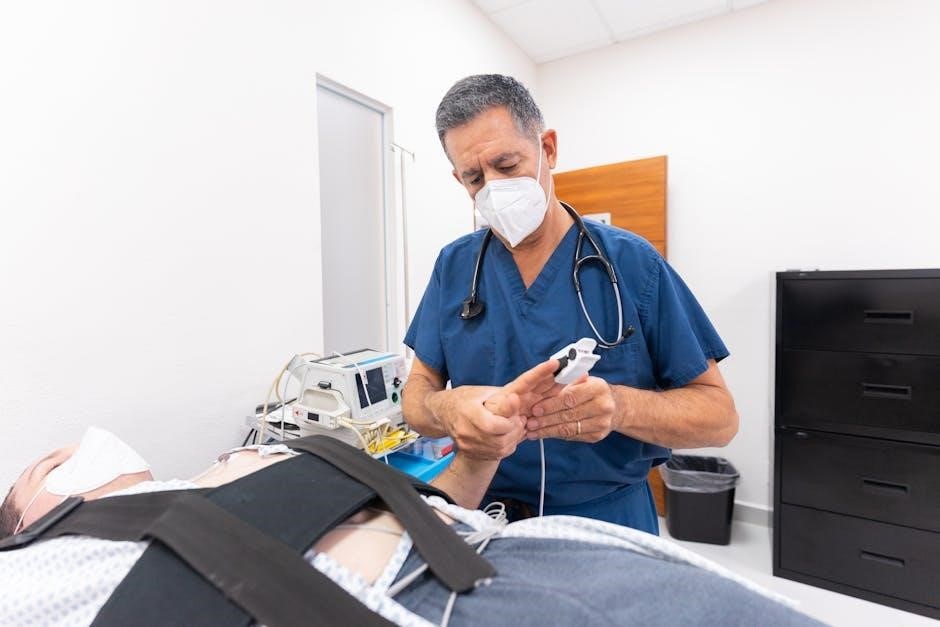An Assisted Living Policy and Procedure Manual is essential for ensuring quality care and compliance with regulatory standards․ It outlines care plans, documentation, and resident needs effectively․
1․1 Overview of Assisted Living Policy and Procedure Manuals
An Assisted Living Policy and Procedure Manual provides a comprehensive framework for delivering quality care․ It includes guidelines for care plans, documentation, and resident needs․ The manual ensures compliance with legal and regulatory standards, promoting operational consistency․ It outlines procedures for admissions, medication management, and incident reporting, serving as a critical resource for staff and administrators․ Effective manuals adapt to resident needs while maintaining high care standards․
1․2 Importance of Having a Comprehensive Manual
A comprehensive manual ensures standardized care delivery, legal compliance, and clear communication․ It protects residents’ rights, enhances safety, and streamlines operations․ By documenting policies and procedures, the manual reduces liability risks and improves staff confidence․ Regular updates ensure alignment with evolving regulations and best practices, fostering a culture of accountability and resident-centered care․ A well-structured manual is vital for maintaining trust and operational excellence in assisted living facilities․
Key Policies and Procedures in Assisted Living
Essential policies ensure safety, dignity, and well-being of residents, covering admission, care plans, confidentiality, and incident reporting, while adhering to legal and ethical standards․
2․1 Admission and Discharge Criteria
Admission criteria ensure residents meet specific needs for assisted living, while discharge criteria address when care requirements exceed facility capabilities․ Clear guidelines balance resident well-being with facility capacity, ensuring safe transitions and compliance with legal standards․ Assessments and documentation are critical to fair and transparent decisions, safeguarding both residents and providers․
2․2 Resident Care Plans and Documentation
Resident care plans are tailored to individual needs, ensuring personalized support and tracking progress․ Documentation is meticulous, detailing medical histories, treatment plans, and daily observations․ Accuracy and confidentiality are prioritized to maintain trust and legal compliance․ Regular updates and reviews ensure plans remain relevant and effective, fostering a high standard of care and accountability within the facility․
2․3 Confidentiality and Privacy Protocols
Confidentiality and privacy are paramount in assisted living facilities․ Protocols ensure resident information is safeguarded, with access limited to authorized personnel․ Policies include secure storage of records, restricted sharing of data, and mandatory staff training on privacy laws․ Breaches are treated seriously, with corrective actions implemented promptly to maintain trust and comply with legal requirements, ensuring residents’ rights are fully respected and protected at all times․
Resident Care and Support
Resident care and support focus on tailored services to meet individual needs, ensuring dignity and well-being․ Care plans are designed to address specific requirements, promoting independence and quality of life․
3․1 Assessment of Resident Needs
The assessment of resident needs involves evaluating physical, emotional, and social requirements to create personalized care plans․ This process includes interviews, evaluations, and reviews of medical history to identify specific needs․ Accurate assessments ensure tailored support, fostering independence and addressing health challenges effectively․ Regular updates and documentation are crucial to adapt care plans as needs evolve over time, ensuring comprehensive and continuous support for residents․
3․2 Development of Individualized Care Plans
Individualized care plans are created based on resident assessments, ensuring tailored support․ These plans outline specific services, health needs, and personal preferences․ Collaboration with residents, families, and staff ensures comprehensive and realistic goals․ Regular reviews and updates adapt plans to changing needs, promoting independence and well-being․ Effective documentation and communication are key to implementing care plans successfully, ensuring residents receive the right level of support at all times․

Medication Management
Medication management is critical for resident safety․ Policies ensure proper administration, documentation, and compliance with regulations․ Accuracy and adherence are essential to prevent errors and ensure well-being․
4․1 Policies for Administering Medications
Medication administration policies ensure safety and compliance․ They outline procedures for handling, storing, and dispensing medications․ Staff must verify prescriptions, document doses, and monitor side effects․ Training is required to maintain accuracy and prevent errors, ensuring residents receive correct medications․ These policies align with federal and state regulations, safeguarding resident health and facility accountability․ Proper documentation is mandatory for accountability and legal compliance․
4․2 Documentation Requirements
Accurate and comprehensive documentation is critical for medication management․ Records must include the type, dosage, and administration time of medications․ Staff should note any adverse reactions or missed doses․ Documentation ensures accountability, legal compliance, and continuity of care․ Regular audits are conducted to verify accuracy and adherence to policies․ This process safeguards resident well-being and facility operations, maintaining transparency and trust․ Proper documentation is essential for all care activities․
Staff Training and Responsibilities
Staff training is vital for ensuring quality care․ Mandatory programs cover caregiver roles, legal requirements, and best practices․ Training ensures compliance and enhances resident well-being effectively always․
5․1 Roles and Responsibilities of Caregivers
Caregivers play a critical role in assisted living, providing direct care, support services, and ensuring residents’ daily needs are met․ They must respect residents’ autonomy and dignity, maintain confidentiality, and adhere to established policies․ Caregivers are responsible for monitoring health changes, assisting with activities of daily living, and communicating effectively with families and healthcare providers․ Their duties also include documenting care activities and reporting concerns promptly to ensure resident well-being․
5․2 Mandatory Training Programs
Mandatory training programs ensure caregivers are equipped to provide quality care․ Topics include infection control, first aid, confidentiality, and emergency preparedness․ Training is typically required upon hiring and annually thereafter․ Facilities may use workshops or online modules to deliver content․ Adaptation of training to the facility’s specific needs ensures relevance and effectiveness, with documentation maintained to confirm completion and compliance with regulatory standards․

Incident Reporting and Investigation
Incident reporting systems document and address resident safety concerns, ensuring timely investigations and maintaining accountability to protect residents and comply with legal standards effectively․
6․1 Types of Incidents Requiring Documentation
Incidents requiring documentation include falls, injuries, medication errors, abuse allegations, and behavioral issues․ These events must be thoroughly recorded to ensure accountability, protect resident safety, and comply with legal standards․ Accurate documentation helps in investigating root causes, improving care processes, and maintaining transparency with families and regulatory bodies․ Timely and detailed reporting is crucial for preventing future incidents and upholding quality care standards․
6․2 Procedures for Reporting and Investigating Incidents
Incidents must be reported immediately to management and documented thoroughly․ Staff should provide detailed accounts, and investigations should be conducted promptly to identify root causes․ Corrective actions must be implemented to prevent recurrence․ All findings and actions should be recorded and reviewed to ensure compliance with policies and regulatory standards, maintaining transparency and accountability in resident care and safety protocols․
Resident Rights and Advocacy
Resident rights are protected through policies ensuring autonomy, dignity, and freedom from abuse․ Advocacy efforts focus on promoting resident voice and involving families in care decisions․
7․1 Protecting Residents from Abuse and Neglect
Assisted living facilities must implement robust policies to prevent abuse and neglect․ Staff training, clear reporting protocols, and documentation requirements ensure resident safety and accountability․ Laws prohibit neglect, abuse, and involuntary seclusion, safeguarding residents’ rights․ Facilities must investigate incidents promptly and involve authorities when necessary․ Families are encouraged to participate in monitoring care quality and reporting concerns to protect their loved ones’ well-being effectively․
7․2 Ensuring Resident Autonomy and Dignity
Assisted living facilities must respect residents’ autonomy, allowing them to make decisions about their daily lives․ Care plans should prioritize individual preferences and needs, ensuring dignity․ Residents’ rights, including privacy and self-determination, must be upheld․ Facilities should foster an environment where residents feel valued and supported, enabling them to maintain independence and personal identity․ Staff training emphasizes person-centered care to promote residents’ autonomy and dignity effectively․
Compliance with Regulatory Standards
Compliance with state and federal regulations is critical for assisted living facilities․ Manuals must align with licensing requirements and standards to ensure legal and ethical operations․
8․1 State and Federal Regulations Governing Assisted Living
State and federal regulations govern assisted living facilities to ensure resident safety and care quality․ These regulations cover licensing, staff qualifications, health standards, and resident rights․ Compliance is mandatory, with regular audits and inspections conducted to enforce adherence․ Facilities must stay updated on regulatory changes to maintain certification and avoid penalties․ Proper documentation and training are key to meeting these standards effectively․
8․2 Licensing and Certification Requirements
Licensing and certification requirements for assisted living facilities vary by state but typically involve meeting specific care standards, staff training, and facility safety protocols․ Facilities must submit applications, pay fees, and undergo inspections to obtain and renew licenses․ Certification may require additional criteria, ensuring higher levels of care and service quality․ Compliance with these requirements is essential for legal operation and resident trust․
Family Involvement and Communication
Family involvement is crucial for resident well-being․ Effective communication strategies ensure families are informed and engaged in care decisions, fostering trust and collaboration․
9․1 Strategies for Effective Family Communication
Effective family communication involves regular updates, active listening, and transparency․ Scheduling family meetings, using clear language, and providing accessible documentation fosters trust․ Staff should be trained to address concerns empathetically, ensuring families feel involved and informed in their loved one’s care․ Open channels of communication help align expectations and promote collaboration in care planning and decision-making processes․
9․2 Involving Families in Care Planning
Involving families in care planning ensures personalized and resident-centered care․ Families provide valuable insights into residents’ preferences, histories, and goals․ Collaborative discussions during care plan development help set realistic objectives and outline support strategies․ Regular updates and feedback loops keep families engaged, fostering a partnership between them and care providers to meet the resident’s evolving needs effectively and respectfully․

Continuous Quality Improvement
Continuous Quality Improvement involves regular audits to ensure compliance and identify areas for enhancement․ Feedback from residents and staff drives meaningful changes, improving care quality and operational efficiency․
10․1 Auditing Processes for Policy Compliance
Auditing processes for policy compliance involve regular reviews of documentation, care practices, and staff training records․ Internal and external audits ensure adherence to regulatory standards and identify gaps in compliance․ These audits assess the effectiveness of care plans, medication management, and incident reporting processes․ Findings are used to implement corrective actions, fostering continuous improvement and maintaining high-quality care standards for residents․
10․2 Implementing Feedback for Service Enhancement
Implementing feedback for service enhancement involves collecting input from residents, families, and staff to identify areas for improvement․ Regular surveys, focus groups, and suggestion boxes are common methods․ Feedback is analyzed to develop actionable recommendations, which are prioritized based on impact and feasibility․ By incorporating feedback into policy updates and staff training, facilities can enhance care quality, communication, and overall resident satisfaction, ensuring a responsive and adaptive service environment․

Emergency Preparedness and Response
Emergency preparedness involves developing response plans, conducting regular drills, and ensuring clear communication protocols․ Staff training is crucial to handle crises effectively and prioritize resident safety․
11․1 Developing Emergency Response Plans
Developing emergency response plans involves creating structured protocols for various scenarios, such as natural disasters, fires, or medical crises․ These plans must include evacuation procedures, communication strategies, and resident prioritization․ Regular updates and staff training ensure preparedness․ Collaboration with local authorities and adherence to regulatory guidelines are essential for effective implementation and resident safety․
11․2 Training Staff for Emergency Situations
Training staff for emergency situations is crucial to ensure resident safety and effective response․ Regular drills, workshops, and simulations prepare caregivers to handle crises confidently․ Topics include evacuation procedures, first aid, and communication protocols․ Continuous education and feedback loops enhance readiness, ensuring all team members understand their roles and responsibilities during emergencies․
An effective Assisted Living Policy and Procedure Manual ensures comprehensive care, safety, and compliance․ It balances resident-centered support with regulatory standards, fostering a culture of continuous improvement and well-being․
12․1 Summary of Key Policies and Procedures
An effective Assisted Living Policy and Procedure Manual outlines clear guidelines for admission, care plans, medication management, staff training, and incident reporting․ It ensures compliance with regulations, protects resident rights, and promotes a safe, dignified environment․ Key policies include confidentiality, abuse prevention, and emergency preparedness, while procedures detail documentation, communication, and continuous quality improvement to meet resident needs and maintain operational excellence․
12․2 Final Thoughts on Effective Assisted Living Management
Effective Assisted Living management relies on a comprehensive manual that guides care delivery, ensures compliance, and prioritizes resident well-being․ Continuous staff training, clear communication, and adaptability to regulatory changes are crucial․ By fostering a resident-centered approach, facilities can enhance quality of life while maintaining operational excellence․ A well-structured policy manual is indispensable for achieving these goals and ensuring sustainable, high-quality care․
